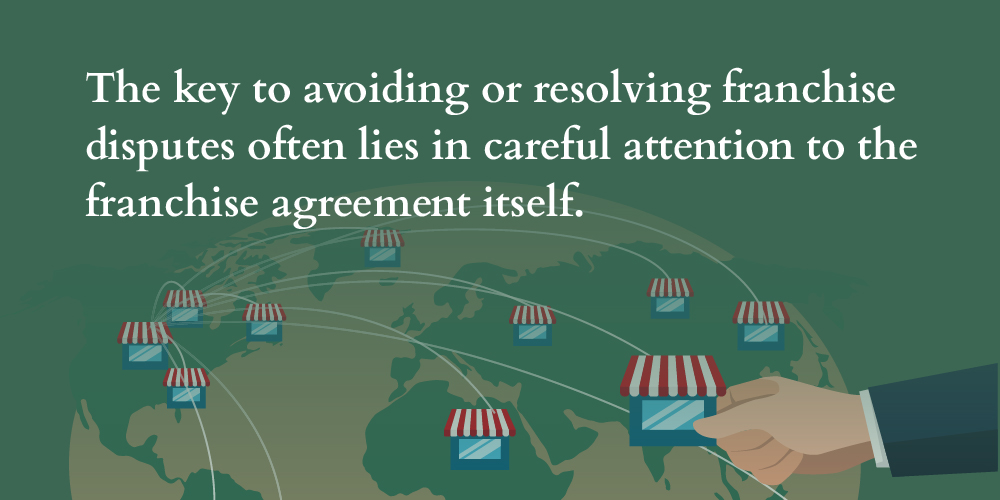Are There Legal Solutions for Disputes Between Franchisors and Franchisees?

Franchise relationships offer business owners in Illinois the advantage of building on an established brand and system. However, these relationships are also governed by complex contracts that can become a source of intense and expensive conflict. When disputes like breach of contract allegations arise between franchisors and franchisees, they can threaten the stability of the business and even lead to litigation.
If you are involved in a franchise dispute, understanding the legal options for resolving the issues you face is essential for protecting your investment and your rights. At Gierach Law Firm, our Naperville business law attorney is here to help, whether you are a franchisee or franchisor.
Common Franchise Disputes
Franchise agreements are detailed contracts that outline the responsibilities of both franchisors and franchisees. These agreements are designed to protect the brand and ensure consistency across locations, but they can also give rise to disagreements.
Disputes often involve allegations of breach of contract. A franchisor may claim that a franchisee failed to comply with operational guidelines, pay royalties on time, or maintain brand standards. Conversely, franchisees may allege that the franchisor has violated their rights by failing to provide adequate support, encroaching on their protected territory, or misrepresenting financial performance during the initial agreement.
Termination of the franchise relationship is another frequent source of conflict. Franchisors sometimes seek to terminate a franchise for alleged violations of the agreement, while franchisees may argue that the termination is wrongful or made in bad faith. These disagreements can have significant financial consequences for both parties.
How Does Illinois Law Regulate Franchise Relationships?
Franchise relationships in Illinois are governed by both state and federal laws. The Illinois Franchise Disclosure Act (815 ILCS 705) requires franchisors to provide a detailed disclosure document to prospective franchisees before any agreements are signed. This document must include information about fees, restrictions, and the franchisor’s legal history to ensure transparency in the relationship.
In addition, franchise agreements are subject to general contract law principles. Courts in Illinois will interpret these agreements based on their plain language, but they also consider whether the terms are unconscionable or violate public policy. For example, noncompete clauses or territorial restrictions may be scrutinized if they are overly broad or place unreasonable burdens on the franchisee.
Can Franchise Disputes Be Resolved Without Going to Court?
Many franchise agreements include mandatory dispute resolution clauses requiring mediation or arbitration before either party can file a lawsuit. Mediation allows franchisors and franchisees to meet with a neutral third party to discuss their differences and work toward a mutually acceptable solution. This process is nonbinding, which means either party can still pursue litigation if mediation fails.
Arbitration, on the other hand, results in a binding decision made by an arbitrator. Arbitration is often faster and less costly than traditional court proceedings, but it limits the parties’ ability to appeal an unfavorable outcome. Because of these limitations, it is important to review the dispute resolution provisions in a franchise agreement carefully before signing.
Even if not required by contract, informal negotiations can sometimes resolve disputes effectively. When both parties are committed to preserving their relationship, reaching a private settlement may be preferable to the time and expense of litigation.
What Happens When a Franchise Dispute Leads to Litigation?
If alternative resolution methods fail or are unavailable, franchise disputes may proceed to court. Litigation begins when one party files a complaint in the appropriate circuit court, alleging breach of contract or other legal claims. The other party then has an opportunity to respond and assert any counterclaims.
During the litigation process, both sides engage in discovery, exchanging documents and information to build their cases. Disputes often involve complex financial records, communications between the parties, and expert testimony on the operation of the franchise system.
Illinois courts have the authority to enforce the terms of the franchise agreement, award damages for financial losses, or issue injunctions to stop certain actions. For example, a court might order a franchisor to honor a franchisee’s exclusive territorial rights or require a franchisee to cease using the franchisor’s trademarks after termination of the agreement.
How Can Franchisors and Franchisees Protect Their Rights?
The key to avoiding or resolving franchise disputes often lies in careful attention to the franchise agreement itself. These contracts typically favor the franchisor, but franchisees can negotiate certain terms before signing. Understanding the scope of obligations, termination provisions, and dispute resolution clauses is critical and having an attorney on your side while you do this can protect you from future disputes.
For franchisees already involved in a dispute, documenting all communications with the franchisor and complying with notice requirements in the agreement can preserve their legal rights. Franchisors, in turn, should ensure that any enforcement of brand standards or termination of a franchise is supported by clear evidence and follows the procedures outlined in the contract.

Common Franchise Litigation Outcomes in Illinois
Franchise disputes that proceed to court result in a variety of outcomes depending on the facts and contractual provisions. Courts may enforce noncompete agreements, requiring a franchisee to cease operations in a certain area after termination of the franchise. Alternatively, a court might rule that a franchisor improperly terminated a franchise and award damages for lost profits or require the franchisor to reinstate the agreement.
In some cases, Illinois courts issue injunctions to prevent franchisors from opening competing locations in a franchisee’s protected territory. Other disputes may center on trademark use, with courts ordering franchisees to immediately stop using the franchisor’s branding if the relationship has ended. The uncertainty of an outcome in a given case underscores the importance of having a skilled business law attorney on your team. A strong advocate will make the difference when it comes to a successful arbitration outcome or presenting a strong argument in court.
Contact a Naperville, IL Business Law Attorney
If you are involved in a dispute with a franchisor or franchisee, contact a DuPage County, IL business law attorney at Gierach Law Firm, LLC. Our firm helps clients resolve complex franchise disagreements and protect their business interests through negotiation, arbitration, or litigation. Call 630-756-1160 to arrange a consultation.
Practice Areas
Archive
+2018
+2016
Please note: These blogs have been created over a period of time and laws and information can change. For the most current information on a topic you are interested in please seek proper legal counsel.














